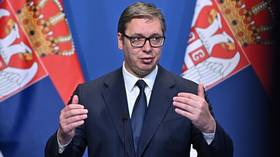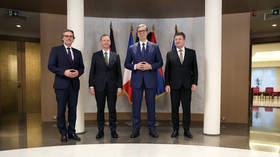Serbia explains refusal to sanction Russia

Should Serbia acquiesce to Western pressure and join anti-Russia sanctions over the Ukraine conflict, the move would only embolden the West in its demands, President Aleksandar Vucic said on Monday.
Speaking at the anniversary of Serbia’s Security Intelligence Agency (BIA), Vucic claimed that the nation has never been in as difficult a position as it is now. However, he said, if Belgrade were to support anti-Russia sanctions, it would not be very helpful.
The Serbian leader insisted Western countries have been using the issue “as a stick and a hammer to hit us on the forums” because they do not have more powerful tools.
“If we were to impose sanctions on Russia tomorrow, for three days they would be very nice, saying you have become part of Europe,” he said. However, Vucic continued, on the fifth day, the West would urge Serbia to “decide whether it is on the right side of history or not.”
By “the right side of history,” Vucic noted, the West would mean that Serbia “has to give up Kosovo and Metohija,” while enticing Serbia with “a small gift,” without providing any more details.
Since the start of Russia’s military campaign in Ukraine in late February, Serbia has been under unprecedented pressure to sanction Russia. However, Vucic has persisted in safeguarding the nation’s neutrality while insisting that Belgrade will still seek EU membership at some point in the future.
Meanwhile, the EU has made it clear that any talks about future membership will be possible only if Serbia recognizes Kosovo – a demand Vucic said he had no plans to accommodate.
NATO occupied Kosovo in 1999 after a 78-day bombing campaign against what was then Yugoslavia. The region unilaterally declared independence in 2008 with the support of the US and many of its allies. The breakaway region, however, was not recognized by several countries, including Russia, China, and Serbia itself.













